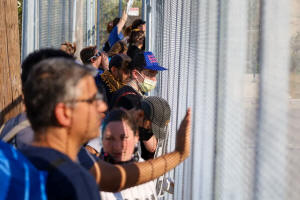Judge grants restraining order protecting protesters, journalists in
Chicago-area clashes
[October 10, 2025]
By Peter Hancock
A federal judge in Chicago issued a temporary restraining order
Thursday, blocking federal agencies from using certain forceful tactics
to suppress protests or prevent journalists from covering those
protests.
Judge Sara L. Ellis issued that order in response to a First Amendment
lawsuit filed Monday on behalf of several news organizations, along with
individual protesters and clergy.
Those plaintiffs alleged that since federal agents were deployed in the
Chicago area in September, “federal agents have shot, gassed, and
detained individuals engaged in cherished and protected activities,”
especially in suburban Broadview near an immigration processing center.
“Never in modern times has the federal government undermined bedrock
constitutional protections on this scale or usurped states’ police power
by directing federal agents to carry out an illegal mission against the
people for the government’s own benefit,” the lawsuit argued.
Defendants in the suit include Homeland Security Secretary Kristi Noem,
Attorney General Pamela Bondi, acting ICE Director Todd Lyons and
numerous other federal officials.
The restraining order temporarily prohibits federal agents from
arresting, threatening to arrest or using physical force against
journalists unless there is probable cause to believe the individual has
committed a crime. It also prohibits them from issuing crowd dispersal
orders, without exigent circumstances, requiring people to leave a
public place where they otherwise have a lawful right to be.
It also prohibits them from using various types of riot control weapons,
including tear gas and other kinds of noxious gas, as well as various
kinds of “less-lethal” weapons and ammunition.

Clashes with federal agents continue growing
Protests erupted in the Chicago area after the Trump administration
launched “Operation Midway Blitz” on Sept. 8, an immigration enforcement
action that the Department of Homeland Security described as an effort
to “target the criminal illegal aliens who flocked to Chicago and
Illinois because they knew Governor Pritzker and his sanctuary policies
would protect them and allow them to roam free on American streets.”
Since that operation began, the complaint argued, “Roving patrols of
masked, militarized, and often unidentifiable agents have been seen on
streets from Chicago’s city center to its suburbs.”
Many of the most volatile protests have taken place in Broadview, where
Immigration and Customs Enforcement operates a processing facility that
houses many of the people who have been arrested or detained during
Operation Midway Blitz.
The lawsuit states that federal authorities have stationed officers on
the roof of that facility, armed with weapons “that are capable of
discharging exploding chemical pellets and rubber bullets, as well as
lethal firearms.” Other officers are assigned to stand in a courtyard
outside the detention facility.
“In response to the protests, these groups of officers sometimes surge
beyond the ICE facility fence without warning and storm the protesters,”
the complaint alleges. “They attack by slamming individual protesters to
the ground, wielding batons and shields, throwing tear gas canisters
indiscriminately at groups of protesters, and macing individual
protesters in the face at close range, among other things.”

[to top of second column]
|

A few dozen protestors and reporters gathered outside an immigration
enforcement facility in Broadview on Saturday, Oct. 4. The facility
has become a focal point of protest since ICE officials expanded
their immigration enforcement in Chicagoland. (Capitol News Illinois
photo by Andrew Adams)

The lawsuit also alleges that federal agents have deliberately targeted
journalists for harassment and intimidation. It lists several incidents
in which reporters have been violently attacked by federal officials,
including a Sept. 29 incident when a CBS Chicago reporter was targeted
while in her car driving near the Broadview ICE facility checking on the
status of the protests.
“A federal agent standing behind the fence shot pepper balls at the
journalist’s car, and chemicals went through her window,” the complaint
states. “There were no protests or activities at Broadview at the time.
The journalist had to stop her car and get out as the chemicals engulfed
the interior of her vehicle.”
The lawsuit was filed Monday, the same day Illinois Attorney General
Kwame Raoul and the city of Chicago filed a separate suit challenging
the legality of the Trump administration’s decision to deploy National
Guard troops in the Chicago area, ostensibly to protect federal
facilities and operations from demonstrators.
The deployment of troops in the Chicago area followed similar actions
earlier this year in Los Angeles and Washington, D.C. Trump also
recently ordered troops into Portland, Oregon, where a federal judge
issued a restraining order preventing him from federalizing the Oregon
National Guard. He has also threatened to deploy troops in other cities,
including New Orleans and Memphis.
Division within journalism community
The First Amendment lawsuit itself was the source of some controversy
within the Illinois journalism community. When it was filed Monday, the
original list of plaintiffs included the Illinois Press Association, a
nonprofit trade association that represents more than 350 newspapers in
Illinois and surrounding states.

On Wednesday, however, court records indicate IPA withdrew as a
plaintiff in the case. According to published reports, some members of
IPA’s board of directors disagreed with the decision to join the
lawsuit, prompting the organization’s president and CEO Don Craven to
resign.
Craven had served as president and CEO since 2021 and as the
organization’s legal counsel for nearly four decades.
IPA issued a news release Thursday announcing Craven’s resignation and
praising him for his service to the organization, but it did not mention
what led to his departure. IPA board Chairman Durrell Garth, president
of the Chicago Citizen Newspaper Group, did not respond to a request for
comment from Capitol News Illinois.
The Illinois Press Association is not affiliated with the Illinois Press
Foundation, which operates and helps fund Capitol News Illinois.
Capitol News Illinois is
a nonprofit, nonpartisan news service that distributes state government
coverage to hundreds of news outlets statewide. It is funded primarily
by the Illinois Press Foundation and the Robert R. McCormick Foundation |